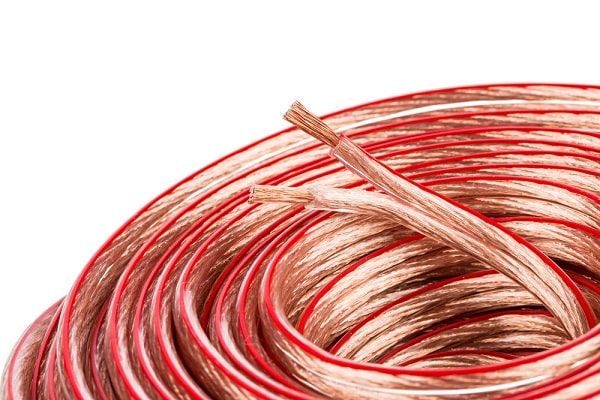Are you tired of trying to decode the technical jargon surrounding speaker wire? Look no further! In this blog post, we will break down the definition of wire and provide you with all the information you need to make an informed decision for your audio setup. Whether you’re a seasoned audiophile or just starting out, understanding speaker wire is essential for achieving optimal sound quality. So let’s dive in and unravel the mysteries of this crucial component in your audio system!
Are you one of those people who has always wondered what wire is and why it’s important? Well, wonder no more! In this blog post, we will be providing a comprehensive definition of speaker wire that will help you understand its role in the world of audio systems. From the types of wires available to their characteristics and uses, we’ve got all the information you need to know about this crucial component for your speakers. So sit back, relax, and let’s dive into the wonderful world of speaker wires!
Types of Speaker Wire
There are essentially three types of speaker wire: aluminium, copper, and steel. Each has its own benefits and drawbacks. Aluminium wire is the lightest type, but it can be brittle and have low resistance. It’s also the cheapest option.
Copper speaker wire is a middleweight and has a higher resistance than aluminium, but it can be less flexible. Steel wire is the heaviest type and has the highest resistance. It’s also the most durable.
There are a few types of wire which can be used in audio applications. The most common type is copper wire, which is used because it has a low resistance and can carry a large amount of electrical current. Other types of wire include aluminium wire and fibre-optic cable.
Characteristics of High-Quality Speaker Wire
Speaker wire is a material used in electrical wiring to carry an audio signal. It is made of thin, insulated wires that are draped around a central conductor. The wires are usually covered with a protective sheath or jacket.
There are several characteristics that define high-quality speaker wire. The wires must be thick enough to resist damage, but thin enough to allow the sound waves through. They must also be flexible enough to fit into tight spaces, but strong enough to support the weight of the speakers.
Speaker wires come in different colours, depending on their intended use. Black speaker wire is typically used for power connections and white wire is typically used for audio connections. wire is a type of cable used to transmit audio frequencies. The term “wire” is typically used when referring to copper wire, while “cable” is typically used when referring to fibre-optic cable. Speaker wire is made of many different types of materials, including copper, aluminium, and plastic.
The most important characteristic of wire is its quality. Good speaker wire will have a high resistance and low capacitance. This means that the wire will not let electricity pass through it easily, which will increase the sound quality. Other important characteristics include flexibility and durability. the wire should be flexible enough so that it can bend without breaking, and it should be durable enough so that it does not wear down quickly.
Connecting Speaker Wire to Speakers and Amplifiers
The proper way to connect speaker wire to speakers and amplifiers is by using a stereo RCA connector. To make the connection, first, identify which of the two RCA plugs goes into which of the two speakers. Next, use a pair of pliers to pinch the adjacent conductors together until they fit snugly into their corresponding plugs. Finally, twist the wires around each conductor once or twice to secure them in place.
When connecting speaker wires to speakers and amplifiers, there are a few key things to keep in mind. The first is that the speaker wires should be of the same gauge (or thickness). This means that the wires are of a consistent size and thickness, so they can carry the same amount of current. Additionally, each conductor in the wire should be insulated with a layer of insulation. This will help to reduce interference and ensure that the signal going through the wire is properly protected. Finally, make sure that the ends of the speaker wire are crimped or soldered onto the terminals on your speakers and amplifier.
Speaker Wire vs. Interconnect Cables: What’s the Difference?
There are many types of speaker wire available on the market, each with its own set of benefits and drawbacks. In this article, we will discuss the key differences between speaker wires and interconnect cables.
Speaker wire is made up of several thin strands of metal that are insulated by a plastic or rubber sheath. This makes it flexible enough to stretch, but stiff enough to conduct sound waves. Interconnect cables are thicker wires that connect your speakers to your amplifier or receiver. They typically have a thicker insulation layer and are not as flexible as speaker wire.
One major advantage of wire is that it is much more flexible than interconnect cables. This makes it easier to route around corners and under furniture, making it a better choice for installations in tight spaces. Interconnect cables can also be more difficult to route because they are stiffer and don’t bend as easily.
Another advantage of wire is that it is less likely to suffer from interference problems than interconnect cables. Interference can occur when two different electrical signals reach your audio equipment at the same time, causing distortion or noise in your audio output. wire has fewer electrical signals running through it, which generally reduces the chances of interference occurring.
One disadvantage of wire is that it can be more difficult to connect your speakers to your amplifier or receiver than with interconnect cables. You’ll need to use an adapter if you’re using speaker wire with an older amplifier or receiver,
Conclusion
A speaker wire is a metal or plastic wire that is used to carry an electric current between two points. It has a number of uses, including in audio and telecommunications. Speaker wire comes in a variety of colours and strengths, so it’s important to choose the right kind for your project. If you’re not sure what wire to buy, consult an expert or ask a friend who is familiar with speaker wiring.


